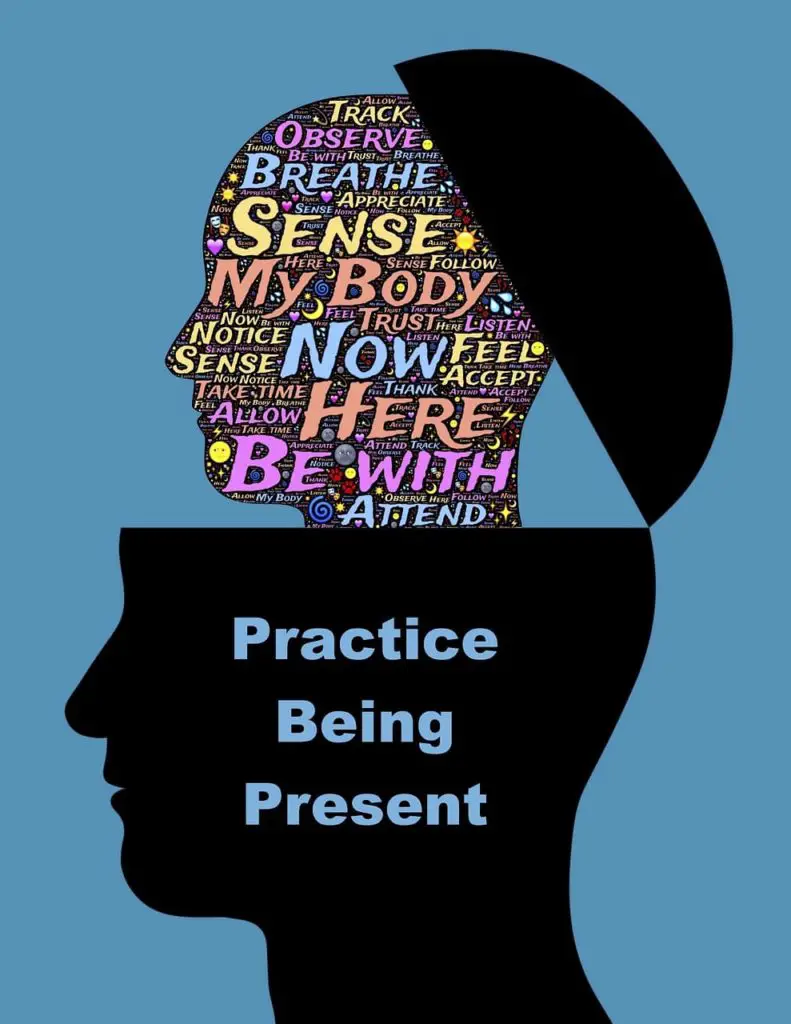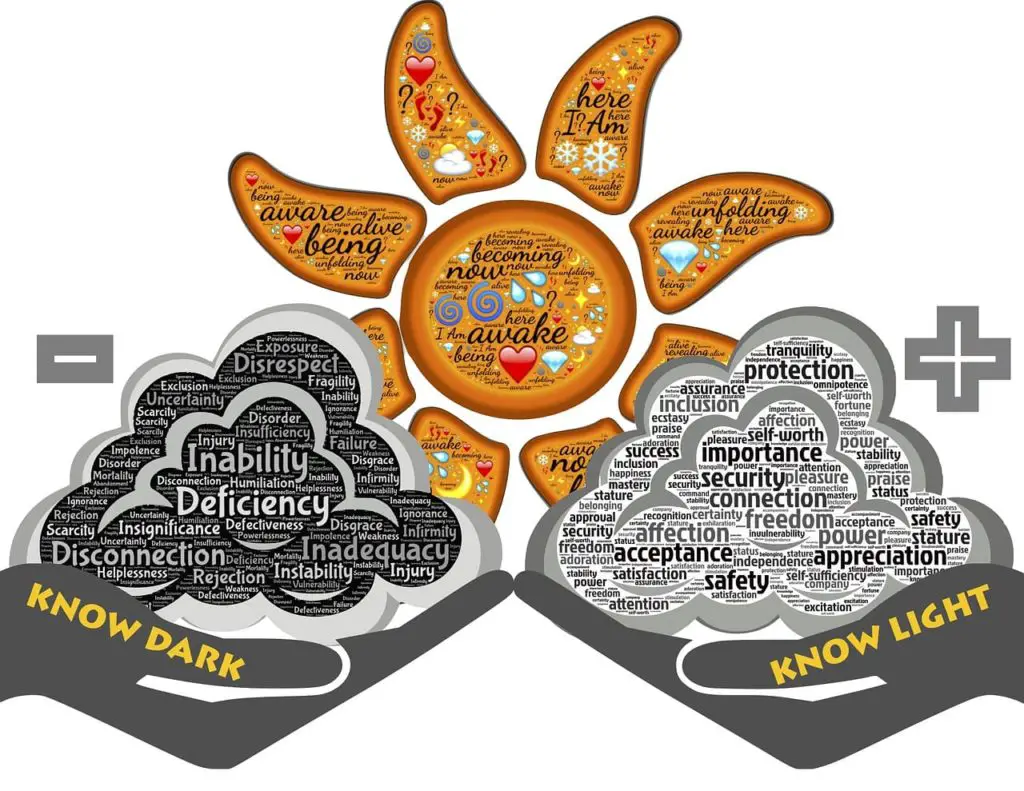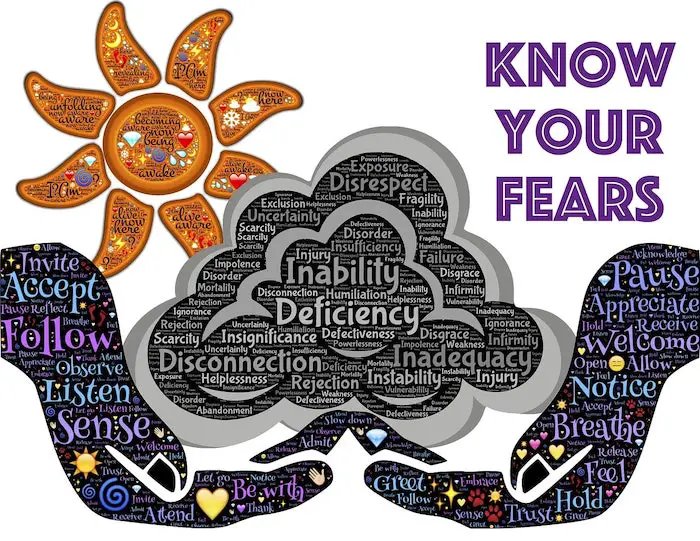MINDFULNESS: Being PRESENT is the KEY to your wellbeing!
Mindfulness has been gaining in popularity recently and it is leaving many people wondering what it is and how it can be used to benefit our day-to-day lives.
Many people are confused by how to practice mindfulness and others think they are being mindful when in fact they have misunderstood what it means to be mindful.
Let’s learn what mindfulness really is, where it came from, and thirty-five uses and benefits that mindfulness can bring into your life.

What Is Mindfulness?
Mindfulness means to focus on the present moment with intention, and also accepting it without judgment.
Being mindful means that you are able to maintain a moment-by-moment awareness of your feelings, thoughts, bodily sensations, as well as what is going on in your surrounding environment.
It means that you aren’t so focused on the past or the future that you are missing what is happening right now.
Being mindful also means that you are accepting of your thoughts and feelings without judging them, or believing that they are right or wrong.

In simple terms, it means that you are aware of everything going on around you and how it makes you feel.
Origins Of Mindfulness
Mindfulness has become increasing popular in Western societies, although it originated in Buddhist philosophy more than two and a half thousand years ago.
Just because mindfulness has its roots in the Buddhist religion, that doesn’t mean that you need to believe or practice the Buddhist faith to gain anything from using mindfulness.
In fact, mindfulness can be practiced by anyone of any faith or religion. It involves training the mind and does not enforce any religious beliefs.
Daily Mindfulness Practice
You can practice being mindful in your everyday life, by simply staying the present moment and not focusing on the past or worrying about the future.

Mindfulness can be applied to many every day situations, for example, mindful eating means paying attention to each and every bite, instead of mindlessly wolfing down your food while watching a television show.
Another example of being mindful in your day-to-day life is staying in the moment of what you are doing, so instead of worrying all day while at work about the horrific traffic waiting for you, you focus on what you are doing each moment of the day, and stay present in that moment.
Remaining mindful in your daily life takes practice, as most people are so used to living in the past or the future that they let the present moment slip away unnoticed and un-enjoyed.
While we may not have control over what happens in life, we do have control over how well we are prepared to deal with it, mindfulness promotes calm, clarity and focus to that end.
With practice, you can master this skill and it will serve you in many different ways.
Mindful Meditation
Mindfulness meditation is a specific practice that helps hone the skill of being mindful and it is unique in that it is not trying to change who we are, but instead it is helping us to become aware of what is already true and happening moment by moment.

There are many different basic techniques to practicing mindful meditation; however, the most popular is the sitting mindful meditation. The steps to do this are as follows.
- First, you want to set up your environment. Since it is unlikely you are going to have a room in your house that you are going to be able to devote just to being mindful, or meditating, you are going to want to choose a corner of a room or a spot in the home where it is quiet and free of distractions.
- Once you have chosen your spot, you are going to need to choose your seat. You can be seated on the floor, a chair, or a cushion, whatever is going to be most comfortable for you. The point is to have a seat that is comfortable and stable. However, you don’t want to be lying down when you are practicing being mindful as this is likely to make you fall asleep and therefore defeat the purpose of this practice.
- Once you have chosen a seat, you are going to want to sit in a posture that is upright, but not rigid. The back should be straight with a natural curve in your lower back. Rest your hands on your thighs, facing down, and let your gaze rest about four to six feet in front of you. You aren’t going to be staring hard at what is in front of you, rather, just looking at what is there. If there is not enough space to look ahead four to six feet, just let your gaze fall wherever is most natural.
- You are going to begin by just sitting this way for a few minutes.
- If your mind wanders, just gently bring it back to your body and the environment. Don’t be too hard on yourself if you find yourself constantly bringing your mind back, you want to let the thoughts happen, but not take over.
- After a few minutes, you are going to begin to notice your breath. Don’t try to control or count it, just notice how your body is while you are breathing in and out.
- Finally, you are going to allow your thoughts to happen. You may notice that you become so caught up in your thoughts that you forget you are in the room. This is normal. Just gently bring yourself back to the room.
Do this for ten minutes to start and work yourself up to about thirty minutes a day or several times per week.

Remember, mindfulness meditation is about being mindful of whatever is happening. It is not about controlling our thoughts, or making ourselves stop thinking.
Focus on the here and the now, the present moment.
35 Uses And Benefits Of Mindfulness
Below you are going to find a list of thirty-five ways you can use mindfulness as well as the benefits mindfulness is going to have on your life.
1. Stress Reduction
There have been many studies that have shown that practicing mindfulness is essential for reducing the levels of stress a person feels. The studies all show that, when presented with a stream of stimuli, those who practice mindful meditation were less likely to be stuck on any one stimulus and were able to be in the moment with each stimuli.
2. Increased Focus

Katherine Maclean of the University of California led a study that showed that people were more skilled at keeping focused on repetitive ad boring tasks during and after mindfulness training.
A second study showed that even with only twenty minutes of practice each day, students were able to increase their scores on a cognitive test, doing up to ten times better than the group who was not practicing each day.
3. Boosted Working Memory
It appears that mindfulness is also effective at boosting the working memory. For example, a 2010 study (Jha et al), documented the benefits of mindfulness meditation on two groups of military members who were under a lot of stress as they prepared for a deployment.
The study showed that the non-meditating military group experienced decreased working memory while the meditating military group experienced an increase in their working memory capacity.
4. Less Emotional Reactivity
A study done in 2007 (Ortner et al), supported the notion that mindfulness meditation decreased the emotional reactivity of individuals. In a study of subjects who ranged from beginners of this practice to masters with more than twenty years of mindfulness meditation practice, it was found that the mindfulness meditation helped people to disengage from emotionally upsetting images.
The people who practiced mindfulness were better able to focus on a cognitive task when they see these pictures than those who did not practice mindfulness.
5. Higher Relationship Satisfaction

Empirical evidence has shown that mindfulness protects against the emotionally stressful effects of a relationship conflict.
Studies have also shown that mindfulness is positively associated with the ability to express oneself and also predict the satisfaction a partner will have in a relationship.
6. More Cognitive Flexibility
Some research has shown that mindfulness meditation is also able to give people greater cognitive flexibility. People who practice mindfulness are more skilled at practicing self-observation; this allows these people to recover faster when they are being negatively provoked.
7. Decreased Anxiety
A study published in JAMA Internal Medicine done by researchers at John Hopkins, showed that there was moderate evidence that mindfulness meditation could alleviate anxiety to a similar degree as drug therapy does.
8. Higher Quality Of Life

Using both qualitative and quantitative measures, a study done in 2002 by Bruce, Young, Turner, Vander Wal, and Linden, found that nursing students reported a higher quality of life when they were practicing mindfulness meditation. This has also been proved in numerous other studies in 2007, 2008, and 2009.
9. Enhanced Self-Acceptance
Studies have shown that practicing mindful meditation encourages positive thinking and positive emotions through compassion and promotes the development of self-acceptance as well as feelings of competence about one’s life.
10. Increased Optimism
When you are practicing mindfulness, you are more open to accepting things just as they are. Mindfulness meditation encourages focusing on the now and not focusing on the future or the past.
By not worrying about what is going to happen in the future or spending time looking back at the past, people are able to cultivate a higher level of optimism and positive emotions in their lives.
11. Reduces Blood Pressure
Relaxation results in the formation of nitric oxide, which opens up your blood vessels. A study published in The Journal of Alternative and Complimentary Medicine showed that of those who practiced mindful meditation for three months, two-thirds of high blood pressure patients showed significant drops in blood pressure.
12. Decreased Depression

In a study that was conducted in Belgium on about 400 middle school children aged thirteen to twenty, it was found that students who followed an in-class mindfulness program experienced fewer indications of depression up to six months later.
These students were also less likely to experience pronounced depression-like symptoms. The University of California also did a study on patients with past depression and found that mindfulness meditation decreased ruminative thinking and dysfunctional beliefs.
13. Increased Gray Matter In The Brain
In a study reported by Sara Lazar, Ph.D., a group of Harvard neuroscientists experiments on sixteen subjects, who took a week long course on mindfulness, which included guided meditation, as well as the integration of mindfulness into everyday activities.
At the end of the study, MRI scans taken of the subjects showed that gray matter concentration increased in areas of the brain that sense of self, regulate emotions, perspective, memory, and learning.
14. Reduces Alcohol And Substance Abuse
According to a University of Washington researcher, Sarah Bowen, substance abuse is an example of how humans are driven towards pleasure and away from pain. Using mindfulness cultivates moment to moment, nonjudgmental awareness of their thoughts, feelings, and surroundings. Using mindfulness-based relapse prevention instead teaches people how to name and tolerate the craving and negative emotions instead of avoiding them.
15. Increased Pain Tolerance

A research group from the University of Montreal compared pain levels in 26 subjects, thirteen of which were Zen masters and the rest were non-practitioners. They exposed all subjects to equal degrees of painful heat while measuring their brain activity through MRI.
They discovered that the Zen practitioners reported less pain than the non-practitioners did.
Interestingly, they even reported less pain than their MRIs showed them to have, which indicated that while their brains may have receive the same level of pain signals, there was actually less pain.
16. Pain Relief
The Wake Forest Baptist Medical center conducted a study using fifteen healthy volunteers who were new to meditation. These volunteers attended four twenty-minute classes to learn mindfulness meditation. Both before and after the training, the participant’s brain activity was examined by MRI while pain was being inflicted using heat.
The study showed that even such a short amount of trained was able to dramatically both the experience of pain as well as pain-related brain activation. The mindfulness meditation produced about a 40% reduction in pain intensity while morphine typically reduces pain intensity by just 25%.
17. Assists In Managing Attention Deficit Hyperactivity Disorder (ADHD)
In a study published in the Clinical Neurophysiology Journal, fifty adult ADHA patients were submitted to Mindfulness Based Cognitive Therapy. These patients demonstrated reduced hyperactivity and impulsivity, and increased skills in acting with awareness. This contributed to an overall improvement in their inattention symptoms.
18. Increased Ability To Ignore Distractions

Emory University in Atlanta conducted a study that demonstrated that participants with more mindfulness experience exhibited an increase in the connectivity within the brain networks that were responsible for controlling attention.
19. Improved Rapid Memory Recall
A group at Harvard Medical School studied the effect of mindfulness meditation on retaining information. The group had no previous experience with mindfulness or meditation. Over an eight-week period, the group showed a marked change in their daily brain function.
They discovered that those who mediate could exert better control over their alpha rhythm, which is a brain wave that is believed to screen out distractions, which makes it easier to process information.
20. Effectively Allocates Limited Brain Resources
If the brain is given two targets to pay attention to, in consecutive order with a half of a second difference in time shown between the two, the second target is often not seen. This is referred to as an attention blink.
The University of California conducted an experiment where a stream of random letters across a computer was shown to subjects in rapid succession. In between the letters, blank screens were also shown. Immediately after the stream ended, subjects were asked to type the letters they had seen as well as whether or not they saw a blank screen, and the results were fascinating.
Subjects with three months of intense meditation training were found to have a better control over the distribution of attention. They showed less allocation of brain resources for each letter shown and showed a reduction in their attention blink size.
21. Fosters Creativity
A research that was conducted by the Leiden University in the Netherlands, demonstrated that the practice of mindful meditation had positive effects in both creativity as well as divergent thinking. Participants who followed the practice performed better when they were given a task to creatively come up with new ideas.
22. Reduced Risk Of Heart Disease
Heart disease kills more people in the world than any other illness. In a study, which was published in 2012, divided a group of high-risk patients into two groups.
Half of the group took a class that taught diet, and exercise, while the other was taught mindful meditation. Through five years of follow, the group that had the meditation enjoyed a 48% reduction in their overall risks for stroke, heart attack, and even death.
23. Decreased Inflammatory Disorders
It was noted during a study that mindfulness meditation reduced levels of pro-inflammatory genes. The study was done in France and Spain at the UW-Madison Waisman Centre and indicated that the practice of mindful meditation was able to produce a wide range of genetic and molecular effects on the participants.
When there is a faster physical recovery from a stressful situation, there was a correlation to the reduced levels of pro-inflammatory genes.
24. Helps Prevent Asthma, Rheumatoid Arthritis and Inflammatory Bowel Disease

A study done by neuroscientists at the University of Wisconsin-Madison concluded that mindfulness techniques were more effective in relieving the inflammatory symptoms of asthma, rheumatoid arthritis, and inflammatory bowel disease than other activities that promote well-being.
In the study, two groups of people were exposed to different methods of stress control. One group received mindfulness training while the other received nutritional education, exercise, and music therapy.
25. Reduced Risk of Alzheimer’s Disease
Recent research that was published online in the journal Brain, Behavior and Immunity stated that thirty minutes of mindful meditation a day reduced the risk of Alzheimer’s. The study was done by UCLA researchers who followed a group of forty men and women aged between fifty-five and eighty-five.
The participants were separated into two groups, one that was asked to participate in weekly two-hour mindfulness meetings, and one who didn’t practice mindfulness. The results were that the group who participated in the mindfulness group was less likely to suffer from Alzheimer’s because of substantially reduced expression of inflammation-related genes.
26. Managing Fibromyalgia
In a study that was published in PubMed, eleven participants suffering from fibromyalgia underwent an eight-week mindfulness-training program. The study found that there were significant improvements in the number of reported “feel good” days and the number of days of “missed work” due to fibromyalgia.
The study also found an improvement in the overall health status of the participants and in their symptoms of stiffness, depression, and anxiety.
27. Increases Longevity
While there is no conclusive research, data has suggested that mindfulness meditation may positively effect telomere length because it reduces cognitive stress and increases positive states of mind along with hormonal factors that lead to the promotion of telomere maintenance. Telomeres are a vital part of human cells that affect how our cells age.
28. Reduced Social Isolation
In a study published in the American Psychological Association, it was found that there was an increase in social connection when subjects engaged in even just a few minutes of meditation. The results indicate that this is an easily implemented technique that may help to increase positive social emotions and decrease social isolation.
29. Increased Levels Of Compassion
A study done by the Stanford School of Medicine found that a nine-week training program in mindfulness improved subject’s abilities in the realm of compassion, including feeling compassion for self, for others and in receiving compassion from others.
30. Reduces Emotional Eating
Mindful meditation helps with the reduction of stress and increases a person’s level of awareness. The hormone cortisol is released as a response to stress. When cortisol is released, there is an increase in insulin resistance, which results in our bodies craving foods it doesn’t need.
When mindful meditation is practiced, there is less stress, and when a person is less stressed or emotional they are better able to confront their emotions without turning to food.
31. Reduced Symptoms Of Panic Disorder
A study published in the American Journal of Psychiatry showed that mindfulness meditation reduced the effects of panic substantially.
The study submitted twenty-two patients to three months of mindfulness meditation. Afterward, twenty of those patients experienced reduced effects of their panic, which were maintained at follow-ups.
32. Improved Information Processing And Decision Making
An assistant professor at UCLA, Eileen Luders, and her colleagues found that those who have been meditating for a long time had more gyrification of the brain than those who never mediated.
Gyrification is the folding of the cortex, which is believed to help the brain process information faster, as well as supporting decision making and attention skills.
33. Emotional Connections With Your Partner
Mindfulness meditation can influence your relationship in many ways. When you are mentally present, you are able to have a better flow of information between what the body is sensing to where it registers in the higher parts of your brain as awareness and understood as emotion.
This leads to both partners who practice being less defensive, improving communication and hearing skills and reducing the chances of reacting impulsively. It also leads to being more receptive to connecting with your partner in meaningful ways, both emotionally and physically.
34. Increased Maternal Bonding During Pregnancy

According to a University of Michigan Health System study, women with high-risk pregnancies who practiced mindfulness for ten weeks, enjoyed significant reductions in symptoms of depression and were also better able to bond with their infants, both while in the womb and after giving birth.
35. Decreased Need For Sleep
While this is still under further investigation, preliminary studies done by the University of Kentucky have shown that mindfulness meditation provides, at minimum, short-term performance improvement in even the most novice of meditators.
In long-term meditators who spend multiple hours in meditation, there is an association of significantly decreased sleeping time when compared to a control who did not meditate but match in age and gender.
This implies that meditation can replace a portion of sleep or even contribute to paying off sleep debt.
Final Thoughts
Now that you have read the effects that mindfulness can have on your body, mind, and quality of life, it is clear to see that there are many benefits that come from practicing mindfulness, and mindful meditation.

In fact, some of the ways that being mindful can affect your life may even surprise you. Practicing mindfulness will bring positive benefits to your emotional, mental, and physical well-being as well as how you interact socially.
While learning how to practice being mindful is going to take some time and effort on your part, you will find that it is more than worth it when you begin to notice the benefits it is bringing to your life as well as to those who are around you.
Everyone wants to be less stressed and happier in his or her lives, and being mindful is a great way to accomplish just that.
Keep in mind that being mindful is not the same as ignoring what is going on around you. It is not the same as clearing your mind of all thoughts; instead, you are going to be more focused on what is happening around you and more accepting of how you are reacting to those same things within the present moment.
Stay mindful and take care!







